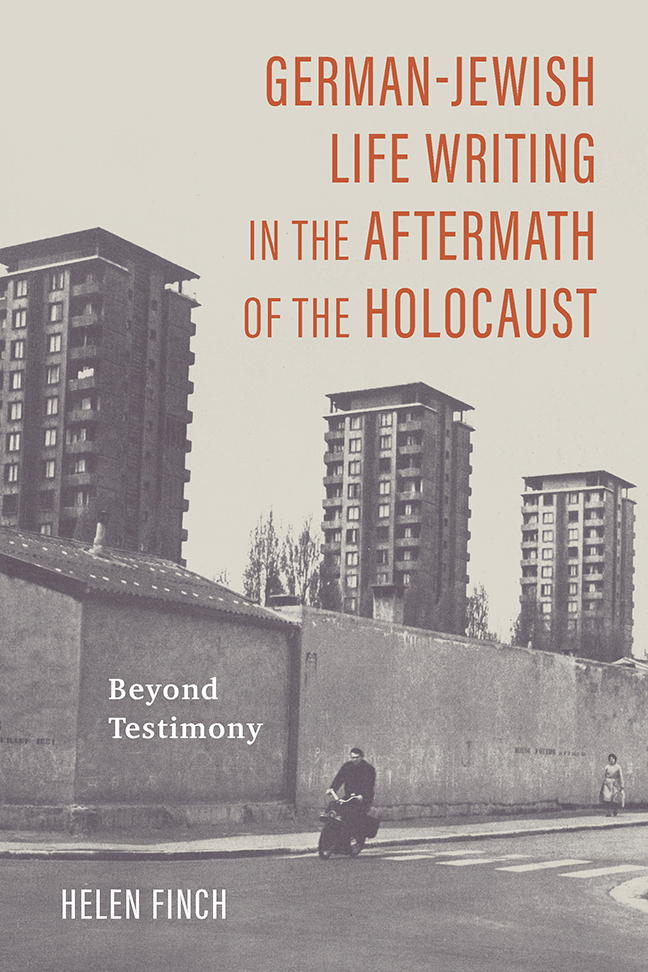Book contents
- Frontmatter
- Dedication
- Contents
- Acknowledgments
- List of Abbreviations
- Introduction
- 1 Modernist Marginalization in Exile: H. G. Adler in the 1950s and 1960s
- 2 Solidarity and Trauma between Austria and the GDR: Fred Wander from the 1960s to 2006
- 3 Transnational Transgression: Edgar Hilsenrath from 1980 to 2018
- 4 Feminist Rage: Ruth Klüger in the New Millennium
- Conclusion
- Bibliography
- Index
1 - Modernist Marginalization in Exile: H. G. Adler in the 1950s and 1960s
Published online by Cambridge University Press: 10 January 2024
- Frontmatter
- Dedication
- Contents
- Acknowledgments
- List of Abbreviations
- Introduction
- 1 Modernist Marginalization in Exile: H. G. Adler in the 1950s and 1960s
- 2 Solidarity and Trauma between Austria and the GDR: Fred Wander from the 1960s to 2006
- 3 Transnational Transgression: Edgar Hilsenrath from 1980 to 2018
- 4 Feminist Rage: Ruth Klüger in the New Millennium
- Conclusion
- Bibliography
- Index
Summary
The Czech-Austrian survivor H G. Adler (1910–1988) was to some extent a paradigm of the forgotten and neglected literary testifier of the Holocaust in the German language. Although a prolific polymath—novelist, lyricist, photographer, sociologist, theologian, cultural historian, among other fields—Adler's literary work received little recognition in West Germany or elsewhere during his lifetime or after his death. In this sense, Adler's battle to gain recognition for his literary work can be seen to parallel the German-language literary sphere's relationship to literature by Jewish people and by survivors in the early years following the Holocaust. Most notably, Heinrich Böll, in his Frankfurt Lectures of 1964, claimed that the very quality of Adler's work was responsible for its neglect by literary critics:
Daß Adlers Buch von der Literaturkritik fast unbemerkt geblieben ist, mag daran liegen, daß es keine Inhaltsangabe ermöglicht, jeder Satz in ihm für sich spricht… . Als das Große an Adlers Buch erscheint mir: daß sich Inhalt, Mitteilung und Ausdruck als kaum trennbar erweisen. So ist kaum Verfälschung möglich, auch nicht Einordnung in ideologische Kategorien.
[The fact that Adler's book has remained almost unnoticed by literary critics may be because it does not permit any summary of the contents, every sentence in it speaks for itself … But the greatness of Adler's book seems to me that contents, message and expression prove to be almost inseparable. Thus no corruption is possible, also no classification in ideological categories.]
For Böll, Adler's lack of success was indicative of the wider crisis in West German society in the 1960s—its lack of a humane Heimat for the individual—which can be combatted through an ‘aesthetics of the humane’ exemplified by Adler's work. Böll makes of Adler a symbol of the ethical condition of German literature in particular, and the political condition of postwar West Germany in general.
Since the 1980s, hardly any book or article has been published about the scholar, poet and novelist that does not contain an analysis of Adler’s unjustly neglected status. The few early volumes that did engage with his work during Adler's lifetime, Buch der Freunde3 and Zu Hause im Exil4 repeatedly thematized Adler as the least known and most overlooked of writers.
- Type
- Chapter
- Information
- German-Jewish Life Writing in the Aftermath of the HolocaustBeyond Testimony, pp. 26 - 64Publisher: Boydell & BrewerPrint publication year: 2023

